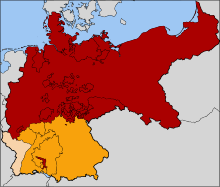
The causes of the Franco-Prussian War are deeply rooted in the events surrounding German unification. In the aftermath of the Austro-Prussian War (1866), Prussia had annexed numerous ethnically German territories and formed the North German Confederation with other German territories. Prussia then turned its attention towards the south of Germany, where it sought to expand its influence.
France was strongly opposed to the annexation of the Southern German States (Bavaria, Wurttemberg, Baden and Hesse-Darmstadt) by the North German Confederation, which would have created too powerful a country next to its border. In Prussia, a war against France was deemed necessary to arouse German nationalism in those States in order to allow the unification of most German states (excluding the ethnically German lands of the Austrian Empire) into a great German empire. This aim was epitomized by Prussian Chancellor Otto von Bismarck's quote: "I knew that a Franco-Prussian War must take place before a united Germany was formed."[1] Bismarck also knew that France should be the aggressor in the conflict to bring the Southern German States to side with Prussia, hence giving Germans numerical superiority.[2]
The immediate cause of the war resided in the candidacy of a Prussian prince to the throne of Spain – France feared encirclement by an alliance between Prussia and Spain. The Hohenzollern prince's candidacy was withdrawn under French diplomatic pressure, but Otto von Bismarck goaded the French into declaring war by altering a dispatch sent by William I. Releasing the Ems Dispatch to the public, Bismarck made it sound as if the king had treated the French envoy in a demeaning fashion. Six days later, France declared war on Prussia and the Southern German States immediately sided with Prussia.[2]
French Emperor Napoleon III and Prime Minister Émile Ollivier's eagerness to relieve France from internal political convulsions also contributed to France's declaration of war on Prussia.[3]
- ^ Otto von Bismarck (A.J. Butler, trans.), Bismarck: The Man and the Statesman, vol. 2, page 58. Originally published in 1898; reprinted in 2007 by Cosimo Classics of New York, New York.
- ^ a b "Franco-German War | History, Causes, & Results". 21 August 2024.
- ^ Wawro, Geoffrey (2003). The Franco Prussian War. Cambridge University Press. ISBN 978-0-521-58436-4.